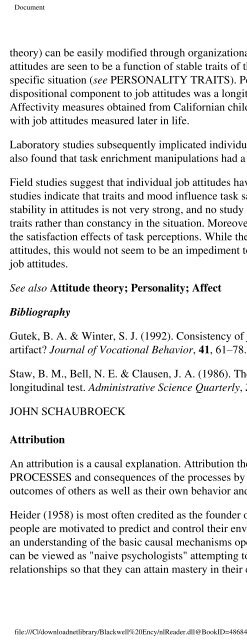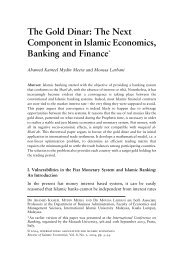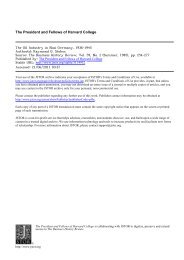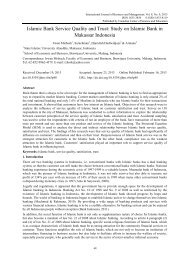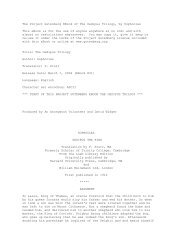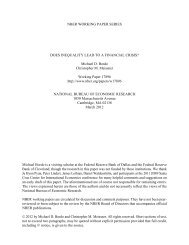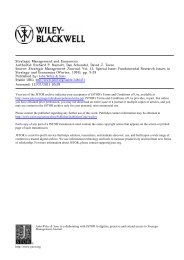- Page 2:
Document The Blackwell Encyclopedic
- Page 6:
Document The Blackwell Encyclopedic
- Page 10:
Document Typeset in 9.5 on 11pt Ehr
- Page 14:
Document Preface Organizational Beh
- Page 18:
Document Page vii all who have shar
- Page 22:
Document current and developing tre
- Page 26:
Document Page ix It is helpful, the
- Page 30:
Document Page x Clearly, to fulfil
- Page 34:
Document Acknowledgments Page xi Th
- Page 38:
Document Contributors Seymour Adler
- Page 42:
Document Adrienne Colella Rutgers U
- Page 46:
Document Daniel C. Feldman Universi
- Page 50:
Document Jerald Hage University of
- Page 54:
Document Kenneth Koput University o
- Page 58:
Document Stella M. Nkomo University
- Page 62:
Document John W. Slocum Southern Me
- Page 66:
Document Edward J. Zajac Northweste
- Page 70:
Document The term can be defined as
- Page 74:
Document The deviance model derives
- Page 78:
Document Goodman, P. S. & Atkin, R.
- Page 82:
Document Dwyer, T. & Raferty, A. E.
- Page 86:
Document Spangler, W. D. (1992). Va
- Page 90:
Document Fryer, D. & Fagan, R. (199
- Page 94:
Document Action Theory can well exp
- Page 98: Document interdependencies among th
- Page 102: Document Mood at work has been negl
- Page 106: Document In all cases we need to as
- Page 110: Document As part of the wider conce
- Page 114: Document Support for ARM comes from
- Page 118: Document See also Exchange relation
- Page 122: Document Employee Assistance Progra
- Page 126: Document NIGEL NICHOLSON Altruism T
- Page 130: Document In ORGANIZATIONAL BEHAVIOR
- Page 134: Document Some form of assessment ta
- Page 138: Document Evidence on the criterion-
- Page 142: Document Gaugler, B., Rosenthal, D.
- Page 146: Document Attitudes are of interest
- Page 152: Document standing and explaining th
- Page 156: Document Page 23 processes within o
- Page 160: Document researchers have become mo
- Page 164: Document the larger part of the man
- Page 168: Document (1) task differentiation -
- Page 172: Document Bibliography Spector, P. (
- Page 176: Document 4. Absolute Competitive Ad
- Page 180: Document Bibliography Lengnick-Hall
- Page 184: Document Individuals frequently fai
- Page 188: Document See also Attribution; Boun
- Page 192: Document Page 32 OF ANALYSIS. Time-
- Page 196: Document of unintentional discrimin
- Page 200:
Document Page 34 less of how desira
- Page 204:
Document Page 35 These assumptions
- Page 208:
Document Page 36 full-time employee
- Page 212:
Document Page 37 designs in which t
- Page 216:
Document Page 38 normal rather than
- Page 220:
Document Page 39 bureaucratic model
- Page 224:
Document Page 40 exhaustion is the
- Page 228:
Document Page 41 studies have been
- Page 232:
Document descriptive/empirical and
- Page 236:
Document See also Organization deve
- Page 240:
Document Career Anchor A career anc
- Page 244:
Document See also Career; Career th
- Page 248:
Document Two dominant theories with
- Page 252:
Document These can be loosely categ
- Page 256:
Document Dalton, G. W. & Thompson,
- Page 260:
Document Finally, the phenomenon of
- Page 264:
Document Future developments in the
- Page 268:
Document Independent of level of an
- Page 272:
Document Notwithstanding this dilem
- Page 276:
Document The outcomes of adjustment
- Page 280:
Document Nicholson, N. (1984). A th
- Page 284:
Document A final word is necessary
- Page 288:
Document In publicly traded corpora
- Page 292:
Document Bibliography Barnard, C. (
- Page 296:
Document Many would consider an eff
- Page 300:
Document Absent these antecedents,
- Page 304:
Document The applied theories that
- Page 308:
Document Social entities with virtu
- Page 312:
Document Classical theory is often
- Page 316:
Document Page 63 The principles of
- Page 320:
Document Political models suggest t
- Page 324:
Document relationship of these COGN
- Page 328:
Document Pondy, L. R. (1983). Union
- Page 332:
Document (b) easily performed (prim
- Page 336:
Document Page 68 sequencing of acti
- Page 340:
Document Collaboration Page 69 The
- Page 344:
Document industry norms may be stro
- Page 348:
Document viors by employees (1991,
- Page 352:
Document no straightforward correla
- Page 356:
Document issue of grievance cannot
- Page 360:
Document Bibliography Clegg, H. A.
- Page 364:
Document Page 75 The general theory
- Page 368:
Document Mowday, R., Porter, L. & S
- Page 372:
Document Page 77 subsequent decisio
- Page 376:
Document Page 78 tion represent two
- Page 380:
Document Page 79 falsehood (see POS
- Page 384:
Document important to consider, stu
- Page 388:
Document Page 81 the nature of orga
- Page 392:
Document Page 82 technologies than
- Page 396:
Document Wholey, 1988). Examples of
- Page 400:
Document Table 1 Definitions of the
- Page 404:
Document Page 85 development of peo
- Page 408:
Document (dynamism) of an organizat
- Page 412:
Document Mintzberg, H. (1973). The
- Page 416:
Document against rivals and sustain
- Page 420:
Document idea the concentration of
- Page 424:
Document Page 90 (Rafaeli & Sutton,
- Page 428:
Document Page 91 ING of staff to op
- Page 432:
Document Page 92 a written text or
- Page 436:
Document Page 93 organizational cir
- Page 440:
Document resolve differences among
- Page 444:
Document Page 95 increasingly relev
- Page 448:
Document Vayrynen, R. (1991). To se
- Page 452:
Document Bibliography Brown, L. D.
- Page 456:
Document Page 98 claim, or the gran
- Page 460:
Document Page 99 While individuals'
- Page 464:
Document Bibliography Porter, M. (1
- Page 468:
Document Consideration see INTERPER
- Page 472:
Document Figure 1 Consulting proces
- Page 476:
Document training do not insure con
- Page 480:
Document Figure 1 Consultancy inter
- Page 484:
Document Consultancy Style see CONS
- Page 488:
Document Thompson, J. D. (1967). Or
- Page 492:
Document Page 107 greater importanc
- Page 496:
Document Page 108 Contracts can be
- Page 500:
Document Page 109 and distinct, gov
- Page 504:
Document and relational contract la
- Page 508:
Document Figure 1 Basic negative fe
- Page 512:
Document Cooperatives A convenient
- Page 516:
Document Brazda, J. & Scheding, R.
- Page 520:
Document Page 114 All these terms e
- Page 524:
Document Page 115 value, or even ma
- Page 528:
Document Page 116 they are "in-hous
- Page 532:
Document Page 117 organizational st
- Page 536:
Document Creativity Enhancement in
- Page 540:
Document Page 119 ecosystem (e.g.,
- Page 544:
Document Page 120 quacies combined
- Page 548:
Document Page 121 category, like "w
- Page 552:
Document Page 122 Culture is freque
- Page 556:
Document Table 1 Small power distan
- Page 560:
Document Page 124 basic components
- Page 564:
Document See also Group dynamics; G
- Page 568:
Document contractual relationships
- Page 572:
Document First, work decisions migh
- Page 576:
Document Hage, J. (1980). Theories
- Page 580:
Document political expediency model
- Page 584:
Document Figure 1 Four models of de
- Page 588:
Document Page 132 accepted by these
- Page 592:
Document ment; Top management teams
- Page 596:
Document Page 134 situational chara
- Page 600:
Document Page 135 similar technique
- Page 604:
Document autonomous organization wh
- Page 608:
Document See also Loose-coupling; D
- Page 612:
Document Page 138 dynamic and turbu
- Page 616:
Document Hampden-Turner, C. (1990).
- Page 620:
Document Page 140 other studies hav
- Page 624:
Document physical unattractiveness.
- Page 628:
Document Page 142 protected group m
- Page 632:
Document Related Diversification Pa
- Page 636:
Document diversified businesses are
- Page 640:
Document Page 145 more generalist,
- Page 644:
Document Page 146 more, there are a
- Page 648:
Document Downsizing Page 147 This r
- Page 652:
Document Page 148 the workforce con
- Page 656:
Document tional change and redesign
- Page 660:
Document Lazarsfeld, P. F. & Menzel
- Page 664:
Document Tellegen, A. (1985). Struc
- Page 668:
Document Company control of emotion
- Page 672:
Document changes to core organizati
- Page 676:
Document In this vein, studies have
- Page 680:
Document The concept was first deve
- Page 684:
Document Huygens was the first to w
- Page 688:
Document This a term which has been
- Page 692:
Document One stream of research on
- Page 696:
Document see ORGANIZATION AND ENVIR
- Page 700:
Document ANGELO DE NISI Equity Theo
- Page 704:
Document JERALD GREENBERG ERG Theor
- Page 708:
Document Interesting issues have ar
- Page 712:
Document Wilson, J. R. & Corlett, E
- Page 716:
Document An error taxonomy is prese
- Page 720:
Document See also Accidents; Persis
- Page 724:
Document For the most part, when et
- Page 728:
Document Bibliography Agar, M. H. (
- Page 732:
Document collective adherence to et
- Page 736:
Document In achieving efficiency, e
- Page 740:
Document Thibaut and Kelley's (1961
- Page 744:
Document The use of third country n
- Page 748:
Document Research thus far suggests
- Page 752:
Document See also Personality; Indi
- Page 756:
Document Most SMALL BUSINESSES as w
- Page 760:
Document Singleton, W. T. (1989). T
- Page 764:
Document Most people in organizatio
- Page 768:
Document Despite its social importa
- Page 772:
Document Traditional industry analy
- Page 776:
Document The notion of flexibility
- Page 780:
Document This term refers to an arr
- Page 784:
Document See also Organization deve
- Page 788:
Document Organizations do not emerg
- Page 792:
Document Pfeffer, J. (1992). Managi
- Page 796:
Document See also Manifest and late
- Page 800:
Document file:///C|/downloadnetlibr
- Page 804:
Document An estimated sixty (plus)
- Page 808:
Document "Games" refer to strategic
- Page 812:
Document See also Prisoner's dilemm
- Page 816:
Document Koopman, P. L., Broekhuyse
- Page 820:
Document Research does frequently s
- Page 824:
Document Taking only a social persp
- Page 828:
Document Wolf, N. (1991). The beaut
- Page 832:
Document acceptance refers to initi
- Page 836:
Document Locke, E. A. (1968). Towar
- Page 840:
Document Stakeholder pressures to r
- Page 844:
Document services. Some organizatio
- Page 848:
Document Page 198 body else becomes
- Page 852:
Document Scott, J. (1991). Social n
- Page 856:
Document Page 200 SION MAKING effec
- Page 860:
Document offering them aloud to the
- Page 864:
Document Page 202 that these change
- Page 868:
Document Katz, R. (1982). The effec
- Page 872:
Document Page 204 AGERIAL STYLE, GR
- Page 876:
Document Page 205 The structural ch
- Page 880:
Document in preferred group roles a
- Page 884:
Document NORMS which prescribe acce
- Page 888:
Document (1972) Victims of Groupthi
- Page 892:
Document Bibliography Hackman, J. R
- Page 896:
Document One issue is measurement.
- Page 900:
Document Ironically, the Hawthorne
- Page 904:
Document Hage, J. (1990). Organizat
- Page 908:
Document Historically, most attenti
- Page 912:
Document Studies of the impact of t
- Page 916:
Document Kling, R. (1980). Social a
- Page 920:
Document The Harvard approach ident
- Page 924:
Document One further element in the
- Page 928:
Document Lawler, E. (1986). High in
- Page 932:
Document See also Human resource ma
- Page 936:
Document into clear focus and demon
- Page 940:
Document Boxall, P. F. (1991). Stra
- Page 944:
I Document Identification Page 223
- Page 948:
Document Page 224 that which is rea
- Page 952:
Document See also Social constructi
- Page 956:
Document Page 226 decade. The curre
- Page 960:
Document Page 227 Giacalone R. A. &
- Page 964:
Document Page 228 psychoanalytic, p
- Page 968:
Document Black Psychology (2nd edn)
- Page 972:
Document findings from industrial s
- Page 976:
Document Maurice, M., Sellier, S. &
- Page 980:
Document general model for an indiv
- Page 984:
Document Page 233 DECISION MAKING,
- Page 988:
Document Page 234 & Holbek, 1973).
- Page 992:
Document rewards tend to increase i
- Page 996:
Document Page 236 de Ven, Angle, an
- Page 1000:
Document innovation, to build acces
- Page 1004:
Document Page 238 cessful process o
- Page 1008:
Document Page 239 quite arbitrary a
- Page 1012:
Document Page 240 a wide range of a
- Page 1016:
Document Page 241 UNCERTAINTY is a
- Page 1020:
Document Page 242 environments cont
- Page 1024:
Document Page 243 based on symbolic
- Page 1028:
Document Page 244 Techniques discus
- Page 1032:
Document limits their use as select
- Page 1036:
Document Page 246 trism, prior to g
- Page 1040:
Document Page 247 group behavior, i
- Page 1044:
Document Page 248 dination, and red
- Page 1048:
Document Page 249 borders, througho
- Page 1052:
Document Page 250 the most attracti
- Page 1056:
Document practices. Research in Per
- Page 1060:
Document Page 252 organizational ch
- Page 1064:
Document which show differences in
- Page 1068:
Document Page 254 There are thus co
- Page 1072:
Document Page 255 (analogous to a r
- Page 1076:
Document Page 256 persisted and hav
- Page 1080:
Document are conceptually distinct,
- Page 1084:
Document communication, use of COMM
- Page 1088:
Document must include development o
- Page 1092:
Document Page 260 Argyris, C. & Sch
- Page 1096:
Document Page 261 job; and individu
- Page 1100:
Document J Japanese Management see
- Page 1104:
Document Page 263 and for establish
- Page 1108:
Document SKILL variety. The degree
- Page 1112:
Document A number of current issues
- Page 1116:
Document Page 266 mulated in terms
- Page 1120:
Document Examples Page 267 A series
- Page 1124:
Document wider perspective and grea
- Page 1128:
Document Page 269 methods, first in
- Page 1132:
Document Page 270 has placed the lo
- Page 1136:
Document Page 271 desirous of oppor
- Page 1140:
Document Page 272 Outcomes include
- Page 1144:
Document Page 273 articles have bee
- Page 1148:
Document Page 274 the more closely
- Page 1152:
Document Page 275 (e.g., ORGANIZATI
- Page 1156:
Document Page 276 Because of the ab
- Page 1160:
Document cooperate with a system or
- Page 1164:
Document ing practices in the Unite
- Page 1168:
Document Justice, Procedural Page 2
- Page 1172:
Document K Kaizen see CONTINUOUS IM
- Page 1176:
Document by the term knowledge work
- Page 1180:
Document The "labor market" general
- Page 1184:
Document There were few Marxist stu
- Page 1188:
Document Although systematic resear
- Page 1192:
Document Examples of leader behavio
- Page 1196:
Document The vast number of empiric
- Page 1200:
Document The generality of prevaili
- Page 1204:
Document Weber (1947) was the first
- Page 1208:
Document Some of the emergence and
- Page 1212:
Document Attitudinal patterns were
- Page 1216:
Document The term operant response
- Page 1220:
Document The concept achieved popul
- Page 1224:
Document This concept operates at m
- Page 1228:
Document This term has at least two
- Page 1232:
Document It has long been recognize
- Page 1236:
Document Liability of Newness/Small
- Page 1240:
Document The distinction between li
- Page 1244:
Document Since Rotter's initial wor
- Page 1248:
Document More properly, loosely cou
- Page 1252:
Document see TASK AND MAINTENANCE B
- Page 1256:
Document German sociologist Max Web
- Page 1260:
Document see COMMUNICATIONS; INFORM
- Page 1264:
Document Although countless books a
- Page 1268:
Document Despite the proliferation
- Page 1272:
Document Developments in Europe hav
- Page 1276:
Document Increasingly, the focus in
- Page 1280:
Document The Nature of Diversity in
- Page 1284:
Document (table continued from prev
- Page 1288:
Document No single theory explains
- Page 1292:
Document The boundaries of the chan
- Page 1296:
Document Jackson, S. E., May, K. E.
- Page 1300:
Document Over the last decade, the
- Page 1304:
Document LYNDA GRATTON Managerial B
- Page 1308:
Document (d) NEGOTIATION over the b
- Page 1312:
Document Machin, J. L. J. (1982). T
- Page 1316:
Document In an influential statemen
- Page 1320:
Document Mass production is importa
- Page 1324:
Document Matrix organization attrac
- Page 1328:
Document Some organizations today a
- Page 1332:
Document The terms gained a conside
- Page 1336:
Document A number of questionnaire
- Page 1340:
Document As the workforce becomes i
- Page 1344:
Document An acquisition is the lega
- Page 1348:
Document Human resource researchers
- Page 1352:
Document impersonal, functional, an
- Page 1356:
Document Minority group INFLUENCE i
- Page 1360:
Document Mission statements serve s
- Page 1364:
Document (1) Moral reasoning increa
- Page 1368:
Document In the organizational beha
- Page 1372:
Document Numerous theories of work
- Page 1376:
Document Personality-based views of
- Page 1380:
Document The popularity of these ap
- Page 1384:
Document than an overall job perfor
- Page 1388:
Document For these reasons, further
- Page 1392:
Document Locke, E. A., Shaw, K. N.,
- Page 1396:
Document Page 337 this threshold ma
- Page 1400:
Document Page 338 in training, but
- Page 1404:
Document Page 339 ments (Farr, 1977
- Page 1408:
Document Page 340 Its strength is l
- Page 1412:
Document Bibliography Bartlett, C.
- Page 1416:
Document N Natural Selection see PO
- Page 1420:
Document Individual Differences Pag
- Page 1424:
Document MACY, or expertise are les
- Page 1428:
Document for mutually beneficial tr
- Page 1432:
Document Page 346 models is clique
- Page 1436:
Document the information content, m
- Page 1440:
Document Bibliography Burt, R. S. (
- Page 1444:
Document Nonprofit Organizations se
- Page 1448:
Document life and nonwork responsib
- Page 1452:
Document (2) Government and its age
- Page 1456:
Document O Obedience Page 352 In th
- Page 1460:
Document Page 353 of LABOR MARKET i
- Page 1464:
Document Page 354 labor market. In
- Page 1468:
Document the variety of disturbance
- Page 1472:
Document Page 356 prescribe best pr
- Page 1476:
Document Page 357 exchanges and the
- Page 1480:
Document help firms to perform more
- Page 1484:
Document Page 359 provide more reso
- Page 1488:
Document particularly through a mor
- Page 1492:
Document Page 361 the United Kingdo
- Page 1496:
Document Page 362 ization, not indi
- Page 1500:
Document Page 363 At about the same
- Page 1504:
Document Page 364 sociology, politi
- Page 1508:
Document Page 365 ment" and "corpor
- Page 1512:
Document North America than in Euro
- Page 1516:
Document Page 367 organizational ch
- Page 1520:
Document Page 368 Typically, observ
- Page 1524:
Document Each stage of development
- Page 1528:
Document Page 370 knowledge, time,
- Page 1532:
Document Page 371 occur between opp
- Page 1536:
Document Page 372 new situations (i
- Page 1540:
Document Page 373 change are explan
- Page 1544:
Document (d) discretionary social w
- Page 1548:
Document Page 375 This has recently
- Page 1552:
Document for-granted aspects of cul
- Page 1556:
Document Page 377 their own persona
- Page 1560:
Document Page 378 has gained wide a
- Page 1564:
Document differences, in part due t
- Page 1568:
Document Page 380 as the defining f
- Page 1572:
Document view). Finally, some probl
- Page 1576:
Document Bibliography Page 382 Alve
- Page 1580:
Document Page 383 continues operati
- Page 1584:
Document Page 384 workforces, due t
- Page 1588:
Document Page 385 Under the heading
- Page 1592:
Document son and illustrate the und
- Page 1596:
Document precisely programmed into
- Page 1600:
Document Page 388 also occur by mea
- Page 1604:
Document by adopting structures whi
- Page 1608:
Document Page 390 systems are arche
- Page 1612:
Document Page 391 applied by schola
- Page 1616:
Document Page 392 effective may not
- Page 1620:
Document Page 393 universalistic de
- Page 1624:
Document Page 394 defects in goods-
- Page 1628:
Document See also Organization theo
- Page 1632:
Document Page 396 routines. Organiz
- Page 1636:
Document Table 1 The characteristic
- Page 1640:
Document strategic and structural d
- Page 1644:
Document Page 400 Where size is not
- Page 1648:
Document Kuhn, T. (1970). The struc
- Page 1652:
Document Participation In an OB con
- Page 1656:
Document factor. Certainly, tests o
- Page 1660:
Document Wall, T. D., Kemp, N. J.,
- Page 1664:
Document House, R. J. (1977). A 197
- Page 1668:
Document Fourth, payment systems di
- Page 1672:
Document Fourth, in a global market
- Page 1676:
Document Much of the research on co
- Page 1680:
Document Several topics are commonl
- Page 1684:
Document Finally, to evaluate perfo
- Page 1688:
Document Campbell, J. P., McCloy, R
- Page 1692:
Document The core elements of all b
- Page 1696:
Document Appraisals vary in the way
- Page 1700:
Document Definitions of what perfor
- Page 1704:
Document Pay for performance is a t
- Page 1708:
Document Page 417 depend on so many
- Page 1712:
Document remains largely unexamined
- Page 1716:
Document general level, organizatio
- Page 1720:
Document Page 420 Weiss and Adler (
- Page 1724:
Document Page 421 existing personal
- Page 1728:
Document Page 422 land's Leadership
- Page 1732:
Document ANALYSIS to identify tasks
- Page 1736:
Document Attempts to enhance the pr
- Page 1740:
Document Page 425 level criteria. I
- Page 1744:
Document Personality Testing Page 4
- Page 1748:
Document Page 427 inappropriately,
- Page 1752:
Document blurring of boundaries, an
- Page 1756:
Document and compromise, reflecting
- Page 1760:
Document Page 430 stakes in the dec
- Page 1764:
Document Page 431 effectiveness or
- Page 1768:
Document Page 432 Hickson, D. et al
- Page 1772:
Document niches available to specia
- Page 1776:
Document Page 434 nathan (1992), wh
- Page 1780:
Document Page 435 more, even when o
- Page 1784:
Document McPherson, J. M. (1983). A
- Page 1788:
Document Page 437 ing rates of chan
- Page 1792:
Document common purposes being soug
- Page 1796:
Document Harassment, sexual or othe
- Page 1800:
Document Campbell (Eds), Productivi
- Page 1804:
Document file:///C|/downloadnetlibr
- Page 1808:
Document EDWIN P. HOLLANDER Power D
- Page 1812:
Document This can be defined as a n
- Page 1816:
Document This is a strategic intera
- Page 1820:
Document The importance of the "bel
- Page 1824:
Document Boardman, A. & Vining, A.
- Page 1828:
Document Process consulting depends
- Page 1832:
Document Mohr (1982) drew a distinc
- Page 1836:
Document When all the input and out
- Page 1840:
Document Kendrick, J. W. (1984). Im
- Page 1844:
Document From the professional's po
- Page 1848:
Document Armstrong, P. (1993). Prof
- Page 1852:
Document The agenda for project adm
- Page 1856:
Document For example, the director
- Page 1860:
Document See also Organizational ec
- Page 1864:
Document Why is the concept of curr
- Page 1868:
Document Greenberg, J. (1990). Orga
- Page 1872:
Document A person's score on a test
- Page 1876:
Document (1) attention from others;
- Page 1880:
Document Sport provides an illustra
- Page 1884:
Document Finally, the contrasts bet
- Page 1888:
Document Punishment and discipline
- Page 1892:
Document Q Quality see TOTAL QUALIT
- Page 1896:
Document Page 464 For example, some
- Page 1900:
Document Page 465 tic and sometimes
- Page 1904:
Document Page 466 of persons come t
- Page 1908:
Document R Race Page 467 Prior to t
- Page 1912:
Document See also Equal opportuniti
- Page 1916:
Document Page 469 the most importan
- Page 1920:
Document Reciprocity Page 470 This
- Page 1924:
Document Page 471 PAYMENT SYSTEMS a
- Page 1928:
Document and argue for a broader ra
- Page 1932:
Document file:///C|/downloadnetlibr
- Page 1936:
Document Applications of operant CO
- Page 1940:
Document Bibliography Capaldi, E. J
- Page 1944:
Document This term refers to the re
- Page 1948:
Document Weigelt and Camerer (1988,
- Page 1952:
Document Although most strategists
- Page 1956:
Document Chakravarthy, B. (1986). M
- Page 1960:
Document STRATEGIC ALLIANCES involv
- Page 1964:
Document 2. Measurement. Measuremen
- Page 1968:
Document Schaubroeck and Kuehn (199
- Page 1972:
Document Schaubroeck, J. & Kuehn, K
- Page 1976:
Document Bibliography Easterby-Smit
- Page 1980:
Document At the macro level, this s
- Page 1984:
Document The concept of resources,
- Page 1988:
Document Because the environment pr
- Page 1992:
Document This is the deliberate mod
- Page 1996:
Document (2) framebreaking change w
- Page 2000:
Document Bibliography Freeman, S. J
- Page 2004:
Document Second, Hanisch (1994) exa
- Page 2008:
Document Finally, studies of job ch
- Page 2012:
Document Schwab, D. P., Rynes, S. L
- Page 2016:
Document Social psychological resea
- Page 2020:
Document (1986) describe the conten
- Page 2024:
Document Kunda, G. (1992). Engineer
- Page 2028:
Document Role conflict is one of se
- Page 2032:
Document Several current organizati
- Page 2036:
Document Bibliography Kahn, R., Wol
- Page 2040:
Document Both overload and underloa
- Page 2044:
Document This term specifies the co
- Page 2048:
Document S Sabotage Page 502 This m
- Page 2052:
Document Page 503 Forms of sabotage
- Page 2056:
Document Page 504 both in the Unite
- Page 2060:
Document criteria, and is therefore
- Page 2064:
Document production and prescribe w
- Page 2068:
Document Page 507 The single issue
- Page 2072:
Document Page 508 performance such
- Page 2076:
Document psychological test of nume
- Page 2080:
Document bined to form a battery of
- Page 2084:
Document Organizational Behavior an
- Page 2088:
Document personal processes (see SE
- Page 2092:
Document Page 513 R. O. Perloff (Ed
- Page 2096:
Document Page 514 tendencies while
- Page 2100:
Document Page 515 tive, and financi
- Page 2104:
Document Page 516 and men tend to h
- Page 2108:
Document woman" standard by some co
- Page 2112:
Document Page 518 to test the sensi
- Page 2116:
Document See also Organizational ef
- Page 2120:
Document Page 520 There have been m
- Page 2124:
Document Page 521 existing critique
- Page 2128:
Document Bibliography Zajonc, R. B.
- Page 2132:
Document differences among Chinese
- Page 2136:
Document Page 524 both the newcomer
- Page 2140:
Document Louis, M. R. (1980). Surpr
- Page 2144:
Document there should be a degree o
- Page 2148:
Document Page 527 Mumford, E. (1987
- Page 2152:
Document 1992) is empirical: An ite
- Page 2156:
Document Bibliography Urwick, L. F.
- Page 2160:
Document organizational behavior. E
- Page 2164:
Document analyses, have been used t
- Page 2168:
Document Page 532 case, status can
- Page 2172:
Document Page 533 overgeneralizatio
- Page 2176:
Document Page 534 JOINT VENTURES).
- Page 2180:
Document Mowery, D. (Ed.), (1988).
- Page 2184:
Document Page 536 relies on multipl
- Page 2188:
Document Cognitive Approaches Page
- Page 2192:
Document Page 538 have, in recent y
- Page 2196:
Document Page 539 concerned with ne
- Page 2200:
Document Page 540 Alarm (in prepara
- Page 2204:
Document Page 541 Ferguson, is the
- Page 2208:
Document Bibliography Page 542 Char
- Page 2212:
Document Page 543 Performance, in t
- Page 2216:
Document Page 544 this level of ana
- Page 2220:
Document Page 545 Succession planni
- Page 2224:
Document (1) the Strong man who dep
- Page 2228:
Document Page 547 dramatically. As
- Page 2232:
Document Page 548 team leader. Desp
- Page 2236:
Document Page 549 Given the widespr
- Page 2240:
Document and applications (pp. 3-28
- Page 2244:
Document Page 551 importance also.
- Page 2248:
Document Page 552 IZATIONAL BEHAVIO
- Page 2252:
Document Page 553 defines a key rol
- Page 2256:
Document T Taboos Page 554 Organiza
- Page 2260:
Document Page 555 See also Group dy
- Page 2264:
Document Page 556 While it was reco
- Page 2268:
Document Team Roles see GROUP ROLES
- Page 2272:
Document Page 558 variety of cuttin
- Page 2276:
Document Technology and Organizatio
- Page 2280:
Document is also significantly affe
- Page 2284:
Document Page 561 boundaries, for e
- Page 2288:
Document Page 562 disciplinary team
- Page 2292:
Document Williams, R. & Gibson, D.
- Page 2296:
Document Page 564 discourse whose p
- Page 2300:
Document Page 565 By way of conclus
- Page 2304:
Document Page 566 all circumstances
- Page 2308:
Document Page 567 organizational re
- Page 2312:
Document well as the characteristic
- Page 2316:
Document Page 569 involvement of se
- Page 2320:
Document Page 570 tices aimed at se
- Page 2324:
Document Page 571 One implication,
- Page 2328:
Document Page 572 are essentially s
- Page 2332:
Document Page 573 substantial prese
- Page 2338:
Document z0592-01.gif Figure 1 An i
- Page 2342:
Document Page 575 organizational sy
- Page 2346:
Document Page 576 system to interac
- Page 2350:
Document programs meeting important
- Page 2354:
Document is clear that the same ins
- Page 2358:
Document Page 579 systems will take
- Page 2362:
Document Page 580 are often highly
- Page 2366:
Document through behavioral modelin
- Page 2370:
Document tance to Williamson's (198
- Page 2374:
Document leadership, after refineme
- Page 2378:
Document Transitions see CAREER TRA
- Page 2382:
Document Page 585 economic actors i
- Page 2386:
Document Barber, B. (1983). The log
- Page 2390:
Document around agents tend to have
- Page 2394:
Document Page 588 MANAGERIAL STYLE)
- Page 2398:
Document Page 589 Mowday, Porter, &
- Page 2402:
Document Page 590 directed at multi
- Page 2406:
Document Page 591 Individuals exhib
- Page 2410:
Document U Uncertainty Page 592 Thi
- Page 2414:
Document Page 593 Hofstede, G. (198
- Page 2418:
Document ment, JOB INSECURITY, and
- Page 2422:
Document Page 595 CESSING). Several
- Page 2426:
Document The validity of data is re
- Page 2430:
Document (5) If necessary or desire
- Page 2434:
Document Because values are learned
- Page 2438:
Document England, G. W. (1967). Org
- Page 2442:
Document These cycles (or circles)
- Page 2446:
Document Example: In an employment
- Page 2450:
Document Historically, the emphasis
- Page 2454:
Document W Withdrawal, Organization
- Page 2458:
Document Page 605 omics, anthropolo
- Page 2462:
Document Page 606 exploring each to
- Page 2466:
Document Reskin, B. & Roos, P. A. (
- Page 2470:
Document Bibliography Brenner, O. C
- Page 2474:
Document Reimann, B. (1980). Organi
- Page 2478:
Document See also Group dynamics; G
- Page 2482:
Document Page 611 conditions for di
- Page 2486:
Document Index Note: Headwords are
- Page 2490:
Document advanced manufacturing tec
- Page 2494:
Document anthropology, 121 anticipa
- Page 2498:
Document and postmodernism, 436 pow
- Page 2502:
Document research design, 480 selec
- Page 2506:
Document typologies, 48 vocational
- Page 2510:
Document civil rights, 141, 241 cla
- Page 2514:
Document collective action, 71, 112
- Page 2518:
Document community ecology, 82 comm
- Page 2522:
Document and reciprocity, 470 sabot
- Page 2526:
Document and ownership, 13 research
- Page 2530:
Document obedience, 352 teleologica
- Page 2534:
Document business ethics, 41 career
- Page 2538:
Document power, 441 resources, 486
- Page 2542:
Document division of labor, 137, 14
- Page 2546:
Document managerial, 316 organizati
- Page 2550:
Document matrix organization, 319 o
- Page 2554:
Document evolutionary theory, organ
- Page 2558:
Document performance appraisal, 413
- Page 2562:
Document Follett, M. P., 63 force f
- Page 2566:
Document roles, 516 sexual harassme
- Page 2570:
Document groupthink, 207 quality ci
- Page 2574:
Document gate keepers, 189 group de
- Page 2578:
Document conflicts, 95 and discrimi
- Page 2582:
Document influence, 231 group dynam
- Page 2586:
Document empirical results, 241 gua
- Page 2590:
Document importance, 257 training,
- Page 2594:
Document job satisfaction, 2, 9, 75
- Page 2598:
Document knowledge of results, 280,
- Page 2602:
Document social constructionism, 52
- Page 2606:
Document management development, 30
- Page 2610:
Document management of high potenti
- Page 2614:
Document and analysis levels, 294 r
- Page 2618:
Document human relations movement,
- Page 2622:
Document innovation, 239 interorgan
- Page 2626:
Document team building, 555 organiz
- Page 2630:
Document demography, 383 differenti
- Page 2634:
Document organizational neurosis, 3
- Page 2638:
Document performance appraisal, 413
- Page 2642:
Document research, 481 performance,
- Page 2646:
Document phenomenology, 228 plannin
- Page 2650:
Document power, 5, 24, 437 autonomy
- Page 2654:
Document process technology, 447, 5
- Page 2658:
Document Q quality, 87, 393, 476 se
- Page 2662:
Document research integrative view,
- Page 2666:
Document resource partitioning, 432
- Page 2670:
Document business ethics, 41 stakeh
- Page 2674:
Document training, 577 selection in
- Page 2678:
Document payment systems, 406 perso
- Page 2682:
Document social loafing, 200, 206,
- Page 2686:
Document international management,
- Page 2690:
Document strategy implementation, 5
- Page 2694:
Document symbolic architecture, 67
- Page 2698:
Document job characteristics, 264 j
- Page 2702:
Document tit-for-tat, 443 top manag
- Page 2706:
Document uncertainty, 592 avoidance
- Page 2710:
Document shared, 599 socialization,
- Page 2714:
Document life stages, 297 paid work
- Page 2718:
Document Y Yin, R. K., 483 file:///


